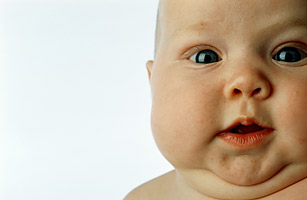
(2 of 2)
On average, researchers found, overweight individuals first crossed the threshold into overweight territory before 22 months of age. In some kids it was even earlier, with about 25% of children already having gained more weight than recommended for their age and height at 3 months. The trajectory typically began early and remained consistent: the BMI of overweight children continuously diverged from that of normal-weight children, the difference increasing by 0.072 units per month starting at birth and crossing the 85th-percentile mark at about 21 months. Within the small sample, half of the overweight children became overweight before age 2, and 90% became overweight by age 5. "You've got to look at it in terms of intervention and prevention," Harrington says. "If you're trying to intervene at age 5, you've already missed the boat."
Part of the problem is that parents and pediatricians tend to overlook early signs of obesity. Many people view children with excess baby fat as healthy, and believe they'll shed the weight as they grow. Harrington advises physicians to start screening babies earlier for immoderate weight gain and to broach the topic sooner with parents. There's a lot parents can do at home to encourage healthy weight in their children, Harrington says, and making even one or two small changes can lead to lowered risk. For instance, Harrington advises parents to adhere to infants' own cues for fullness and hunger, rather than encouraging them to eat more. And toddlers are "grazers," so it's perfectly healthy for them not to conform to an adult schedule of three square meals per day, he says.
Harrington's study, first published online in February by the journal Clinical Pediatrics, suggests that the optimal age for instilling healthy eating and activity behaviors is before age 2. As children get older, it becomes more difficult to unlearn behaviors and reverse the trend, Harrington says. "The first thing to do is to recognize that there's a problem and to see that maybe it didn't start at age 4 or 5, or 6 or 7, but maybe before then," he says. "The longer you're overweight, the more likely it is that you're going to be overweight as an adult."
Getting a Head Start
Not all chubby kids grow up to be overweight adults; indeed, many heavy babies do shed their baby fat and remain slim thereafter. Determining which children are at higher risk, however, is easier said than done. The study that could answer that question has not yet been conducted. "The only way to do that is to do a prospective study of 10,000 kids, following them from birth to see what their trajectories are," Harrington says. One such study is in the works — the National Children's Study, which aims to follow 100,000 babies from the womb to age 21, was authorized by Congress in 2000 — but results from that research are still years away.
For now, researchers say national childhood obesity prevention and education efforts should include families with newborns and toddlers, and promote healthy habits starting in pregnancy or earlier. Even seemingly minor actions, such as reminding pregnant women that they should not in fact be "eating for two" — in spite of their grandmother's best advice — could reduce children's chances of becoming obese, says Taveras. "Some of these things become so embedded in our thinking that they actually become our standard of care for our children," she says. "If we really try to start focusing on prevention earlier, we might have a greater impact."